YuYu interview Chris Tashima
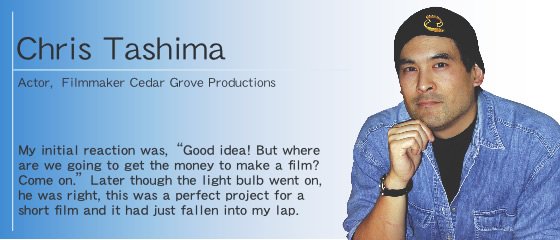 |
| —— How did you get interested in acting and making films? Since I was a kid growing up in Pasadena and Berkley, I had an interest in movie making. I knew that somehow I’d like to work in the movie industry. At first, I was attracted by the big movies that were around at the time such as Star Wars etc. Back then, identity wise, I wasn’t really conscious of who I was. I didn’t really pay much attention to the fact that the kind of films that I wanted to make were mainstream films… that’s what I dreamed about. I grew up in mostly white neighborhoods. Although I was involved in some Asian American activities when I was in Jr. High, I don’t really think that I appreciated what they were trying to teach us. Still, it was enough to make me aware that there were some issues there—however little I identified with them—at least I had some vague understanding. 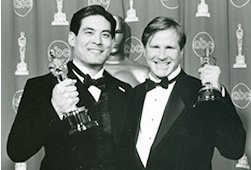
Oscar night brought smiles and recognition for a job well done as“Visas and Virtue”took home the 1997 Academy Award for Best Live Action Short. Chris Tashima, director, and Chris Donahue, producer.
When I was going to college I decided I wanted to go to a major film school, as was the fashion following George Lucas, so I thought I’d go to USC. Turns out I ended up going to UC Santa Cruz for a couple of years and took some film theory classes and some directing classes. I thought I’d transfer to UCLA, which I did, and get into their Motion Picture/ TV major or Film School. I also applied to USC’s film school and the Art Center College of Design—and I didn’t get into any of them! —— So what did you do? Well, when I left college, I tried to do some films on my own, but I never finished them and they never really went anywhere. I wasn’t really doing too much, so I started doing some extra work; it was easy to do, fun and you get a free lunch. That’s what led to my interest in performing. You don’t get lines, but you do assume a character and it’s up to you how much you do. That lead to me sending out headshots, looking in “Drama Log” to see what kind of roles where out there. Slowly I got the courage to do more. I did some student films that did have lines and I became more and more interested in performing. Until then my only interest was behind the camera. I never really wanted to be IN any of the films I was doing. I had no interest—or even understood it. —— So now you were interested in becoming an actor? Well, this new path led me to East West Players, an Asian American theater company. I think it’s the oldest one. In the “trades” they ran some casting notices looking for young, Asian male actors and I looked at some of the breakdowns and I thought “ I kinda fit that.” so I would send in my headshot. Not having done any theater, and hardly having gone to any theater—I didn’t get any of those roles. Luckily, back then they weren’t videotaping auditions (laughing)! My actor’s resume— mostly made up—or at least highly inflated, had a section for special skills. Mine was playing the violin and I actually could. One day East West called me up and asked me if I really did play, because they were looking for on-stage musicians for a certain show, and since I could I got the job. It didn’t pay anything, but it was my introduction to theater. Turns out they changed the concept, but from that I got to experience everything from first rehearsals, all the way through previews, opening night and the run of the play….I got to absorb the whole thing. It was a classic case of getting bit by the bug! My first taste of theater and I just fell in love with it. 
“Visas and Virtue”tells the true-life tale of Chiune“Sempo”Sugihara, who was responsible for saving 6,000 Jews from Hitler’s tyranny during WWII.
Well, the following show, I was also part of the band…and I was even given some lines, but my big break came the very next show. I was only supposed to understudy the lead, but suddenly he dropped out and I was given the lead. I got to work with some really good directors and got some hands on experience about what acting is, what theater is. East West was a great place for me to learn and to soak in as much as possible. During my time there I became aware of what it is to be Asian American; in the industry and just in general. I mean, this theater was founded because there were no opportunities for Asian American actors—twenty years later, in the mid-eighties, there was still a huge need. Suddenly I became aware that all the movies I grew up watching, excluded Asian Americans! Things started to make sense to me. I realized how wrong that was and how that had affected my images of myself, because I wasn’t white—and I thought I needed to be to be accepted. A lot of the shows that we did there were about Asian American history… so I was learning a lot. —— So East West Players not only introduced you to theater and acting, but a whole area of your own culture that you had never explored before? Right! Politics and racism in show-business and it’s impact on me. And how there was a need for all kinds of change. We’re just excluded from so much that we should be a part of… and that even includes the history that I was taught in school. We study U.S. history and European history, but we don’t study Asian history. So my three or four years of working at East-West really changed the whole direction of where I wanted to go. I went from wanting to do the mainstream Hollywood films and rejecting stories about Asian Americans—because I felt like they were a copout—to doing Asian themed projects to the exclusion of everything else. I used to think these stories were too small, but what was really happening was that I was just denying the importance of what they meant to me. Suddenly, I saw no point in doing anything else. —— So how did you and Tim Toyama end up working together? I first met Tim in the mid-nineties at EWP. I shouldn’t say I met him, I saw him while he was doing the lights and I was their designing sets. He was also taking one of their playwriting workshops… and they were doing a reading of one of his pieces when another actor/director asked me if I would be interested in reading for one of his plays. A year later he wrote another one-act play about this Japanese diplomat in Lithuania, Chiune “Sempo” Sugihara, that had rescued 6,000 Jews during the holocaust, which was to become “Visas and Virtue”. By this time I had been working in theater for 10 years and I knew something about acting and something about not having opportunities to do good roles and here was this tremendously deep character, very heroic and a very important story. It was a great experience, not only playing this role, but how it was affecting the audience. We performed it in a small, black box theater in North Hollywood. The audience (holding out his arm) was only this far away and you could hear and feel their reaction. As these things go it was very successful; we sold out every night, even though it was only supposed to be 6 weeks, it ended up being 8 or 10. 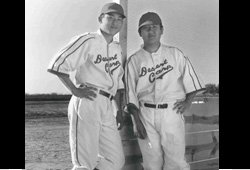
“Day of Independence”sheds some light on the challenges of baseball and life in the internment camps.
I wish I could say it was my idea, but the guy who directed it, Tom Donaldson, said, “Why don’t we make a film or video of this performance, so that it all doesn’t get lost on closing night.” My initial reaction was, “Good idea! But where are we going to get the money to make a film? Come on.” Video taping it might have been good for archival purposes, but it’s just not the same. Later though the light bulb went on, he was right, this was a perfect project for a short film and it had just fallen into my lap. It was a story that had appeal to both the Japanese and Jewish communities, so we thought we could probably get some funding, and it gave me the opportunity to get back to what I had wanted to do all along—making films. —— Is that what lead you two to form Cedar Grove Productions? Back in 1995-96, when Tim said, “Yeah, let’s do it.” we decided to form a production company to make it. In my readings I had seen where the literal translation of Sugihara was cedar grove and that sort of stuck in my mind, so when it came time to pick a name I asked Tim, “What about Cedar Grove Productions?” At that time everything was about Sugihara-san’s story so it made sense. Later, when we decided to keep the production company going, we decided to keep it. 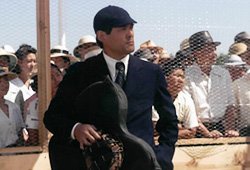
Making the call in front of the camera in“Day of Independence”,and behind as director.
We knew it would be difficult…there was a lot to do, but it was doable. We set to work adapting the script and initially, it was almost exactly the same as the stage script with a few changes and concessions for film…fade up instead of curtain rise. I didn’t want to change anything because I didn’t think we should— because what we had already was just magic. It had worked so well every night and that’s what I was trying to capture. As things progressed the script evolved in small ways, which is only natural because theater and film are very different mediums, but the core of it remained unchanged. From the production standpoint one thing led to another and we found our location, we found our people to help us build the sets and we struggled to get donations and materials. We faced some unexpected delays and had to postpone production for 9-months. We lost 2 producers just before shooting and had to pull the plug and there were times when we weren’t sure it was really going to happen, but we persevered. We had almost a year and a half to prep for a 22-minute film. We didn’t have the money big productions normally require, but we had some really good people, people that knew what it would take and people that went above and beyond the call because it was something that mattered to them. —— Not a bad start winning an Academy Award? We couldn’t have asked for things to go any better than they did with our first film “Visas and Virtue” winning an Academy Award for Best Live Action Short. Both of us, Tim and I, had other stories that we were interested in seeing done and had very similar motivation. We didn’t know what that meant at the time, but we knew we wanted to build on the success we already had and keep it going. —— What do you look for in a story or project? Does Cedar Grove Productions have an overriding theme or mission in how it’s stories are told? Yes, there is definitely a theme and similar goals on the projects or stories that we are interested in. Looking back on “Visas and Virtues” it wasn’t an accident that it ended up the way it did. Tim was inspired by a piece of history that just was very moving. He then took that and created a great piece of drama around it. Then we brought together some very talented people to lead our production. So it’s a combination of meaningful stories, very well told, with high quality and professional filmmakers—that’s how we work. Our goal is to layer the story, subject and history and hopefully that will make people interested and want to ask questions. The film will pose many more questions than it answers, because it is not a documentary. —— You’ve chosen historical stories, which could have been made into documentaries and taken a different approach, a docudrama style if you will. Why did you choose that style to tell these stories? First of all, documentaries are way too hard to make! I really admire a well done documentary because I find them extremely difficult. I think part of the answer to your question comes from the fact that both of us come from a theater background and that has a certain way of story telling. Part of it is my love for a well told Hollywood story and ultimately I want to make movies in that sense. Like when Tim wrote “Day of Independence” he took subject matter that we all thought was important, internment, and then folded in other personal stories into that, telling the story of his grandfather who was dying in camp, but left to die in Japan while telling his son, “You’re an American, so you stay here.” —— What can we expect to see from you and Cedar Grove Productions in the future? Our main project at the moment is another short film “Memorial Day” …actually a sequel to our current release “Day of Independence”. “Memorial Day” picks up from where “Day of Independence” leaves off and tells the story of the 442nd, a Japanese American fighting unit from WWII. It basically follows a squad of guys and shows their friendship and how they worked together. We follow them to Europe in 1945, into battle and post war. Some of themmake it back, but as you know most of them don’t. It’s an amazing story and piece of history that most people are not aware of. 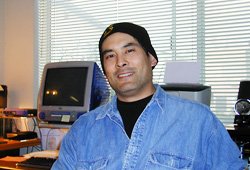
Chris taking a moment at the Cedar Grove Productions office.
Well I call myself an actor/ filmmaker. I don’t really consider myself a writer, but I consider myself a film director. I’m interested in making films that have a certain message to them, because there are all these stories that need to be told. In terms of acting, I’m interested in acting in almost anything. Part of what I think needs to happen, happens if I’m simply cast in the role, and that is for there to be an Asian presence on screen. As an actor I’d like to be able to try all different sorts of things, while as a director there are some very specific things I want to do. Directing allows me more control, to take on a project and see it through from concept to the finished film, so it’s important that you really love that story. And the stories I really want to work on are the ones that I feel really need to be told. —— I can see that your journey as an actor and filmmaker has been one of self-discovery, are you still finding out more about yourself? I think that’s a great way to put it. I think I am still finding out a lot about myself. It’s been very gradual and it’s happened very slowly over many, many years. I still don’t feel that I’ve achieved nearly what I want to and in terms of my career I’m still struggling to be where I want to be as an actor and for us as a production company. I feel like most of it is yet to be written. There is still so much more that I want to do. Sometimes I feel like I’m still at the bottom looking up and seeing where I would like to be, stories I would like to get told. (03-01-2005 issue, Interviewed by Terry Nicholas) |

